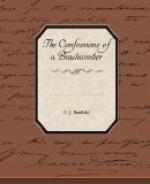PRIDE OF RACE
“Harry” was a splendid specimen of humanity. Tall, lithesome, handsome, intelligent, proud of superior abilities, prouder of his style. In his time he played many parts. A stockrider, when he would appear in a gay shirt, tight white moleskins, cabbage-tree hat, flash riding-boots with glittering spurs. A bullock driver, when his costume would be more subdued, but when he would be fully equipped, even to the chirpy phrases in which working bullocks are accustomed to be addressed. Then as a vagrant black, when his attire would be nothing at all in camp, and little more than a frowsy blanket when visiting the town. But in all of his characters he had an unconstrained contempt for Chinese, and delighted in ridiculing and frightening them. In the part of a bullock-driver he drew up his team in front of a store. The manager shouted—“Don’t want that load here, Harry! You tak ’em to back store. You savee?” The “savee” touched Harry’s dignity. “What for you say savee? You take me for a blurry Chinaman?”
Class distinction prevails even among the race. “Polly,” in her own estimation, was highly civilised, and posed haughtily before her uncultured cousins. Looking across to the mainland beach one day, she said—“Whiteman walk about over there, longa beach.” Then, gazing more fixedly, and with all possible disdain in her tones—“No; only nigger!”
Nearly all civilised blacks have exalted opinions of themselves. It is told that Marsh, the aboriginal bowler, of Sydney, wanted to join the Australian Natives’ Association, and on being black-balled said—“Those fellows, Australian natives! My people were leading people in Australia when their people were supping porridge in Scotland or digging potatoes in Ireland.” When Marsh and Henry met as rival fast bowlers in a match between Queensland and New South Wales, it was proposed to the former that he should be introduced to the Queenslander. “What!” he ejaculated—“that myall? No, thank you. It’s quite bad enough to meet him on the field. Why, the fellow would want to go in to tea with me. Give him a ’possum.” These yarns may be too good to be true, but they at least illustrate a well-recognised phase of aboriginal character.
“Yankee Charley”
At rare intervals one finds a black who knows how to drive a bargain. “Yankee Charley” came, badly wanting a shirt. The only one available was valued at 2s. 6d., and Charley produced 2s., protesting that that represented his total capital, the extreme limit of his financial resources—his uttermost farthing, as it were. At that sum the Boss disposed of the shirt, for the need of the stranger within his gates threatened to become shocking, as “Yankee Charley” possessed few of the “artificial contrivances that hold society together!” Retiring to the scrub, Charley took off his ruined singlet, came back smiling in his new shirt, and with delightful candour tendered 6d. for a flash handkerchief. He got it for his smartness.




